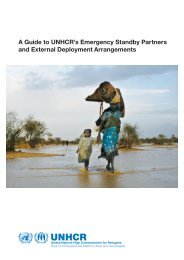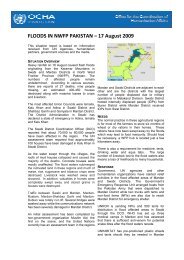Women, Girls, Boys and men - HumanitarianInfo.org
Women, Girls, Boys and men - HumanitarianInfo.org
Women, Girls, Boys and men - HumanitarianInfo.org
Create successful ePaper yourself
Turn your PDF publications into a flip-book with our unique Google optimized e-Paper software.
LEGAL FRAMEWORK<br />
0<br />
I A s c g e n D e r h A n D b o o k<br />
• Restrictions <strong>and</strong> prohibitions on the use of specific<br />
weapons: The principle of distinction set out above<br />
prohibits parties to a conflict from employing weapons<br />
incapable of distinguishing between combatants <strong>and</strong><br />
civilians. The lasting effect of weapons on civilians is<br />
also a consideration that may lead to the restriction or<br />
prohibition of the use of certain weapons, such as antipersonnel<br />
mines. IHL also prohibits the use of weapons<br />
or methods of warfare of a nature to cause superfluous<br />
injury or unnecessary suffering.<br />
Spec fic Protect on:<br />
The specific protection regime for wo<strong>men</strong> under IHL relates<br />
primarily to wo<strong>men</strong>’s distinct health, hygiene <strong>and</strong><br />
physiological needs <strong>and</strong> role as mothers. The aim of these<br />
specific provisions is to provide additional protection for<br />
wo<strong>men</strong> in response to their particular medical <strong>and</strong> physiological<br />
needs, <strong>and</strong> for considerations of privacy.<br />
• Protection against sexual violence: IHL expressly protects<br />
wo<strong>men</strong> against rape through Article 27(2) of the<br />
4th Geneva Convention, which reads: “<strong>Wo<strong>men</strong></strong> shall be<br />
especially protected against any attack on their honour,<br />
in particular against rape, enforced prostitution, or any<br />
form of indecent assault.” Since the word honour did<br />
not reflect the full brutality of the act of sexual violence,<br />
which is not merely an attack on a woman’s modesty or<br />
chastity, but on her physical <strong>and</strong> psychological well-being,<br />
the Additional Protocols replaced it with the term<br />
“dignity.” In addition, it is well established that sexual<br />
violence falls within the prohibitions of cruel treat<strong>men</strong>t<br />
or torture in the Geneva Conventions.<br />
• <strong>Wo<strong>men</strong></strong> deprived of their liberty: IHL contains specific<br />
protections for wo<strong>men</strong> deprived of their liberty, requiring<br />
separate quarters <strong>and</strong> sanitary conveniences for<br />
wo<strong>men</strong> (unless wo<strong>men</strong> <strong>and</strong> <strong>men</strong> are accommodated<br />
together as members of the same family) <strong>and</strong> stipulating<br />
that wo<strong>men</strong> must be held under the immediate supervision<br />
of female guards. Sex is also considered a relevant<br />
consideration in the determination of disciplinary<br />
punish<strong>men</strong>t <strong>and</strong> in the labour of prisoners of war.<br />
• Expectant mothers <strong>and</strong> maternity cases: A range of<br />
provisions deal with expectant mothers, maternity cases<br />
<strong>and</strong> mothers of children under 7 years old. Interned<br />
expectant <strong>and</strong> nursing mothers are to be given additional<br />
food in proportion to their physiological needs<br />
<strong>and</strong> interned maternity cases have a right to be admitted<br />
to institutions where they can receive adequate<br />
medical treat<strong>men</strong>t. In terms of physical safety, parties<br />
to armed conflict are encouraged to adopt practices to<br />
ensure the physical safety of pregnant wo<strong>men</strong> by establishing<br />
safety zones for pregnant wo<strong>men</strong> <strong>and</strong> mothers<br />
of young children or by concluding agree<strong>men</strong>ts for<br />
the evacuation of maternity cases.<br />
T H e I n T e R n AT I o n A l l e G A l F R A m e w o R k F o R P R o T e C T I o n<br />
• Preservation of family links: <strong>Wo<strong>men</strong></strong> are the main initiators<br />
of requests for news of family members, bearing<br />
the emotional <strong>and</strong> economic burden of missing loved<br />
ones. Such wo<strong>men</strong> often lack a clear legal status under<br />
national law — not being recognized by the law either<br />
as wives or widows — <strong>and</strong> may have no right to access<br />
pensions or other entitle<strong>men</strong>ts. In an attempt, inter<br />
alia, to address such issues, IHL seeks to preserve <strong>and</strong><br />
restore family unity by preventing the separation of<br />
family members against their will, requiring the adoption<br />
of measures that facilitate family reunification <strong>and</strong><br />
laying down measures aimed at facilitating the re-<br />
establish<strong>men</strong>t of family ties through correspondence<br />
<strong>and</strong> transmission of information.<br />
InTErnATIonAl rEFuGEE lAW<br />
International refugee law is the branch of law that deals<br />
with the rights <strong>and</strong> protection of refugees. The main principles<br />
of refugee law are set out in the 1951 Convention<br />
relating to the Status of Refugees <strong>and</strong> its 1967 Protocol,<br />
which sets out the general definition of a refugee <strong>and</strong><br />
guarantees refugees a number of rights specific to their<br />
status. Other important instru<strong>men</strong>ts include regional<br />
refugee instru<strong>men</strong>ts, the Statute of the UN High Commissioner<br />
for Refugees (UNHCR) <strong>and</strong> the Conclusions of its<br />
Executive Committee (ExCom).<br />
While gender is not specifically <strong>men</strong>tioned in refugee law<br />
it is widely accepted that the refugee definition, when<br />
properly interpreted, covers gender-related claims. The<br />
1951 Convention defines a refugee as someone who is<br />
outside his or her country of origin or habitual residence<br />
<strong>and</strong> is unable or unwilling to return there owing to a wellfounded<br />
fear of persecution on the grounds of race, religion,<br />
nationality, membership of a particular social group<br />
or political opinion. An exp<strong>and</strong>ed definition is used by<br />
UNHCR under its m<strong>and</strong>ate <strong>and</strong> in some regional treaties,<br />
including also persons who flee their country because<br />
their lives, safety or freedom have been threatened by<br />
conflict, generalized violence or events seriously disturbing<br />
public order. Gender can both influence <strong>and</strong> dictate<br />
the type of harm suffered. While wo<strong>men</strong>, girls, boys <strong>and</strong><br />
<strong>men</strong> will often suffer similar harm, wo<strong>men</strong> <strong>and</strong> girls are<br />
often the main targets of violence <strong>and</strong> abuse because of<br />
their gender. For example, wo<strong>men</strong> <strong>and</strong> girls are more likely<br />
to suffer rape <strong>and</strong> other forms of gender-related violence,<br />
such as dowry-related violence, coerced family planning,<br />
female genital mutilation, family/domestic violence <strong>and</strong><br />
trafficking. Such acts, whether perpetrated by a State or<br />
non-State actor, can support a claim to refugee status.<br />
Asylum claims may also be based on discriminatory acts<br />
amounting to persecution, persecution on account of<br />
one’s sexual orientation <strong>and</strong> trafficking for the purposes











